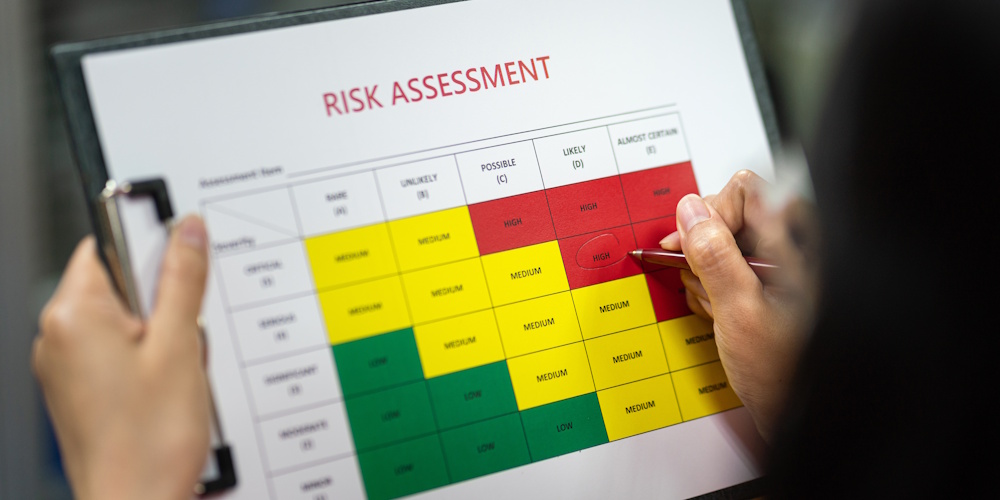Recent Posts
Categories
Stay Informed

In today’s fast-paced digital world, small and medium-sized businesses (SMBs) face their fair share of challenges in maintaining their IT infrastructure and protecting their data. One of the most effective ways to tackle these challenges is through comprehensive risk assessments. Let’s dive into what risk assessments are, why they are crucial for SMBs, and how they can help mitigate potential threats.

What is a Risk Assessment?
Think of a risk assessment as a health check-up for your business’s IT systems. It’s a systematic process of identifying, analyzing, and evaluating potential risks that could negatively impact your organization’s assets, operations, or reputation. For SMBs, this means examining your IT systems, data, and processes to uncover vulnerabilities and threats. The goal is to develop strategies to manage and mitigate these risks, ensuring your business remains secure and resilient.
Why Are Risk Assessments Crucial?
Spot Weaknesses: Risk assessments help you identify weaknesses in your IT infrastructure, such as outdated software, weak passwords, or insufficient security protocols. By pinpointing these vulnerabilities, you can take proactive measures to address them before cybercriminals exploit them.
Prevent Threats: Understanding the risks allows you to implement appropriate safeguards to protect your assets. This could include installing next generation firewalls, encryption, and intrusion detection systems, as well as educating employees on cybersecurity best practices.
Stay Compliant: Many industries have regulatory requirements for data protection and cybersecurity. Regular risk assessments help you stay compliant with these regulations, avoiding potential fines and legal issues.
Make Informed Decisions: By having a clear understanding of the risks, you can make informed decisions about your IT investments and prioritize resources effectively. This ensures that the most critical areas are addressed first, maximizing the impact of your security efforts.
Build Trust and Authority: Conducting regular risk assessments demonstrates your commitment to security and data protection. This can enhance the trust and confidence of your clients, partners, and stakeholders, positioning your business as reliable and sustainable.

How Risk Assessments Help Mitigate Potential Threats
Risk assessments provide a blueprint for securing your network and digital assets. Here are some key steps involved in the process:
Identify Assets: Determine which information assets are most valuable to your business and could be targeted by threats.
Analyze Threats: Identify potential threats, including physical threats, system failures, digital threats, and human error, that could harm your business.
- Assess Vulnerabilities: Evaluate your network and data security posture to understand the prevalent and imminent threats.
- Evaluate Risks: Assess the potential impact of the threats and prioritize them based on their severity and likelihood.
- Develop Mitigation Strategies: Create and implement strategies to mitigate the highest risks, such as updating software, enhancing security protocols, and conducting employee training.
- Monitor Continuously: Regularly review and update the risk assessment to ensure it remains relevant and effective in addressing new and emerging threats.
Real-World Examples and Statistics
To illustrate the importance of risk assessments, let’s look at some real-world examples and statistics:
- A small manufacturing company conducted a risk assessment and discovered that their outdated software was a significant vulnerability. By updating their software and implementing stronger security protocols, they were able to prevent a potential cyber-attack that could have cost them thousands of dollars in damages.
- A non-profit organization identified that their employees were not following proper cybersecurity practices. Through a risk assessment, they implemented a comprehensive employee training program, which significantly reduced the number of phishing incidents and improved overall security awareness.
- According to a study by the Ponemon Institute, 60% of SMBs that experience a cyber-attack go out of business within six months. This highlights the critical importance of proactive risk assessments to identify and mitigate potential threats before they cause irreparable damage.
- The National Cyber Security Alliance reports that 70% of cyber-attacks target small businesses. Regular risk assessments can help SMBs stay ahead of these threats and protect their valuable assets.
In Conclusion
For SMBs in the Greater Cincinnati Area and beyond, risk assessments are an essential tool for safeguarding your IT infrastructure and data. By identifying vulnerabilities, mitigating potential threats, ensuring compliance, enhancing decision-making, and building trust, risk assessments help your business stay secure and resilient in an increasingly digital world.
If you’re an SMB in need of IT services, or an existing client looking for additional services, contact ISOCNET today to learn more about how we can help you protect your business with comprehensive risk assessments.



